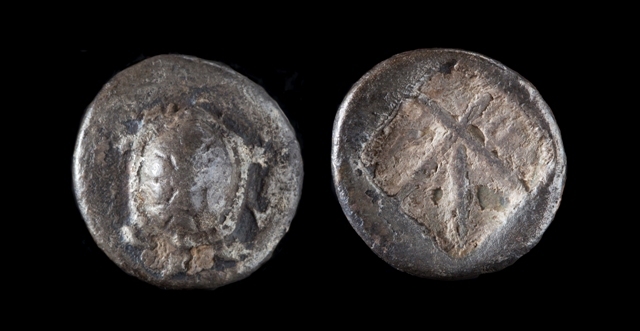Aegina, Silver Drachm
Dublin Core
Title
Aegina, Silver Drachm
Subject
Aegina, Silver Drachm, ca. 350 BCE.
OBVERSE: Land turtle, head turned right, seen from above, flanked by the initials of AIGINA, the letter "alpha" on its left, "iota" on the right
REVERSE: Five-part incuse square with thin, partly rectilinear bands; remnants of letters (?) in upper two divisions, of a dolphin in lower rectangular division.
OBVERSE: Land turtle, head turned right, seen from above, flanked by the initials of AIGINA, the letter "alpha" on its left, "iota" on the right
REVERSE: Five-part incuse square with thin, partly rectilinear bands; remnants of letters (?) in upper two divisions, of a dolphin in lower rectangular division.
Description
Aegina was the first island in Greece proper to mint coinage, around 580 BCE. The iconic turtle was always part of the design, first a sea turtle and then a land turtle. The sea turtle was likely a reference to their naval fleet which, from the seventh to fifth centuries BCE, was one of the most powerful in Greece; even contributing a third of the ships used to fight Xerxes at Salamis in 480 BCE. The reason for the change from sea to land turtles is unknown. They did lose some of their naval prominence as the centuries progressed but there is no clear explanation of the change.
Until the Peloponnesian War, the chelonai (turtles) were the only universally accepted coinage in the Peloponnese. They were so common, in fact, that a proverb was created:
“Virtue and wisdom are vanquished by turtles." Aeginetan weight standards were also copied by many other cities in Northern Greece and Asia Minor.
In 458 BCE, Athens conquered Aegina and forced out its citizens. When Athens was defeated about fifty years later, in 404 BCE, the Aeginetans were finally allowed to return and they celebrated with the release of a new batch of chelonai, to which this coin belongs.
Until the Peloponnesian War, the chelonai (turtles) were the only universally accepted coinage in the Peloponnese. They were so common, in fact, that a proverb was created:
“Virtue and wisdom are vanquished by turtles." Aeginetan weight standards were also copied by many other cities in Northern Greece and Asia Minor.
In 458 BCE, Athens conquered Aegina and forced out its citizens. When Athens was defeated about fifty years later, in 404 BCE, the Aeginetans were finally allowed to return and they celebrated with the release of a new batch of chelonai, to which this coin belongs.
Source
Gift of James and Aneta McIntyre, Hallie Ford Museum of Art, Salem, OR. 2006.010.014
Date
ca. 350 BCE
Rights
Hallie Ford Museum of Art
Format
1.730 cm
5.100 gr
5.100 gr
Type
Coin
Identifier
Chelonai
Coverage
This item can be viewed on the Hallie Ford Museum of Art's website.
Citation
“Aegina, Silver Drachm,” Hallie Ford Museum of Art Exhibits, accessed February 25, 2026, https://library.willamette.edu/hfma/omeka/items/show/66.
